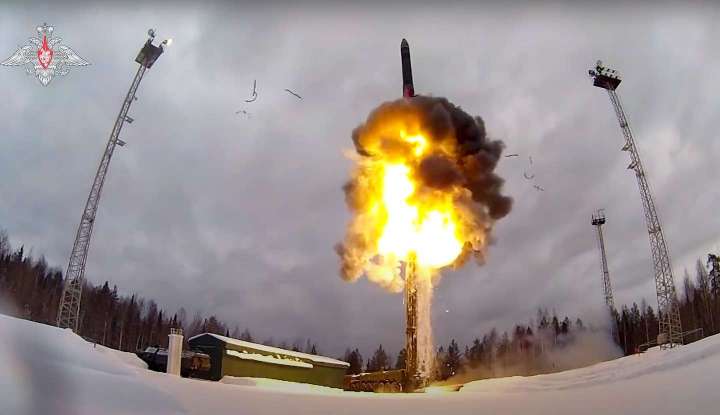Let’s not play down what has happened this week. The leader of the world’s largest nuclear power publicly threatened to use nuclear weapons. In an address in Moscow on Wednesday, Vladimir Putin declared that Russia would use “all weapon systems available to us” to defend the country. He emphasized, “This is not a bluff.”
Putin has just made the world a far more dangerous place

It might be. Putin’s threat is at odds with traditional Soviet military doctrine, which once ruled out “first use.” Under his leadership, the Russian military now contemplates scenarios in which it could use nuclear weapons. But Putin knows that the West has powerful nuclear weapons of its own; and he knows that the doctrine of “mutually assured destruction” has prevented any power from deploying them since 1945. Moreover, these kinds of threats must rattle China, India and all those countries that have been trying to steer a course between Russia and the West.
But what does it tell us that Putin decided to make his statement anyway? That the war is going very badly for him. This month, Ukrainian forces routed the Russian army in a stunning series of victories. Putin’s first response was to open a new Ferris wheel in Moscow, urging people to “relax” and enjoy life. A few days later, realizing that the “relax” strategy was not working, he scheduled a national television address during prime time — and then simply didn’t show up. He did give his address the next morning, using the occasion to issue his nuclear threat.
To understand how badly the Ukraine war has gone from Putin’s point of view, consider his decision to announce a partial mobilization. Russia did not mobilize its population for the nine-year war in Afghanistan. It did not do so during the Russo-Japanese war in 1904-1905. Moscow has mobilized its citizenry for war twice since the start of the 20th century, first on the eve of World War I and then to defend against the invasion of the country by Adolf Hitler and Germany in 1941.
Follow Fareed Zakaria‘s opinions
FollowFor Putin in particular, this is a bitter pill. His basic social contract with the Russian people has been: “Stay out of politics, don’t mind my kleptocracy, and I will give you a stable, peaceful country in which you can make a decent living.” This mobilization is the first time he has had to violate that contract.
And, for the first time in his 22-year reign, he faces opposition from both the right and the left. At least 1,300 war protesters have been arrested since Putin’s announcement. But more ominously, right-wing nationalists are openly criticizing the government for not prosecuting this war with greater zeal, manpower and firepower. When a war goes badly, people look for someone to blame. In a dictatorship so centralized, it is hard to see whom to fault other than Putin himself.
His recent actions all raise the ante. In addition to threatening the use of nuclear weapons and mobilizing Russians, he has also signaled that four regions of Ukraine will soon become part of Russia. (Crimea was also incorporated by Moscow in 2014.) This will make it harder to negotiate a peace deal because, under Russian law, these areas would then be part of Russian territory. Annexation also makes it easier to claim that Ukrainian attacks on those territories are not part of a contested conflict but an attack on Russia itself, requiring any and all means to respond.
Of course, this will not deter the Ukrainians. They know that Russia has invaded their lands, destroyed their cities, tortured their people, and killed and wounded tens of thousands. They will fight to regain their country. And Putin’s threats are not going to stop the West from aiding and arming Ukraine. So what is Putin’s game, and where does he go from here?
No one knows, including perhaps Putin himself. He has given some signals to India’s Narendra Modi and Turkey’s Recep Tayyip Erdogan that he wants to negotiate. But the Russian leader does seem to be playing a very high-stakes game in which he knows that the outcome could be catastrophic. It is still hard to see how, even if he loses this war, anyone in Moscow could dislodge him. More than perhaps any major nation in the world, Russia is now ruled by one man. There are no institutions — no Politburo, no Central Committee, no monarchy. Nothing. The largest country in the world, with the most nuclear weapons, is ruled by one man. It is, as he once described it, a “vertical of power.” And that vertical looks more unstable than ever.
All of this suggests that we have entered one of the most dangerous periods in international relations in our lifetimes.






